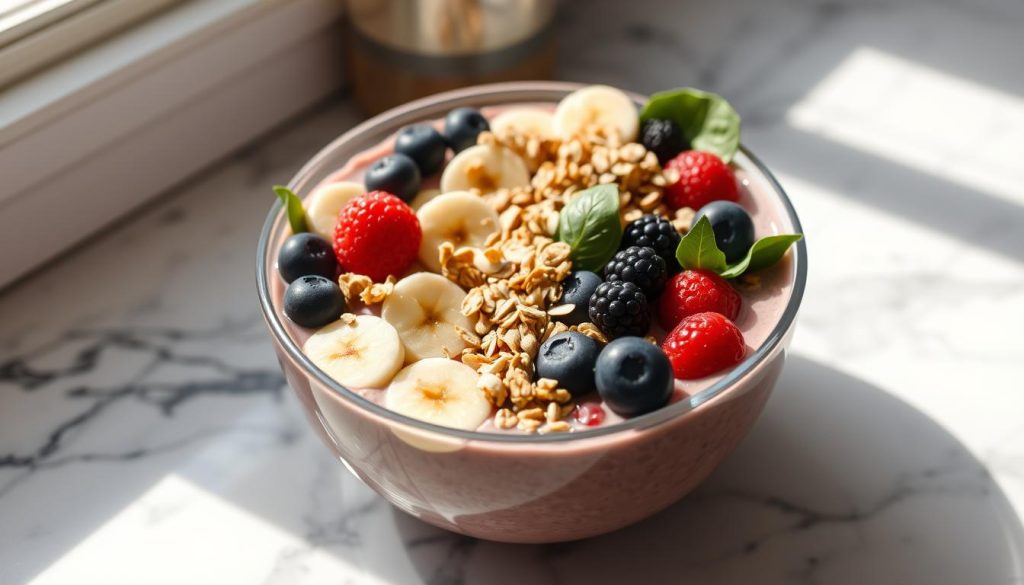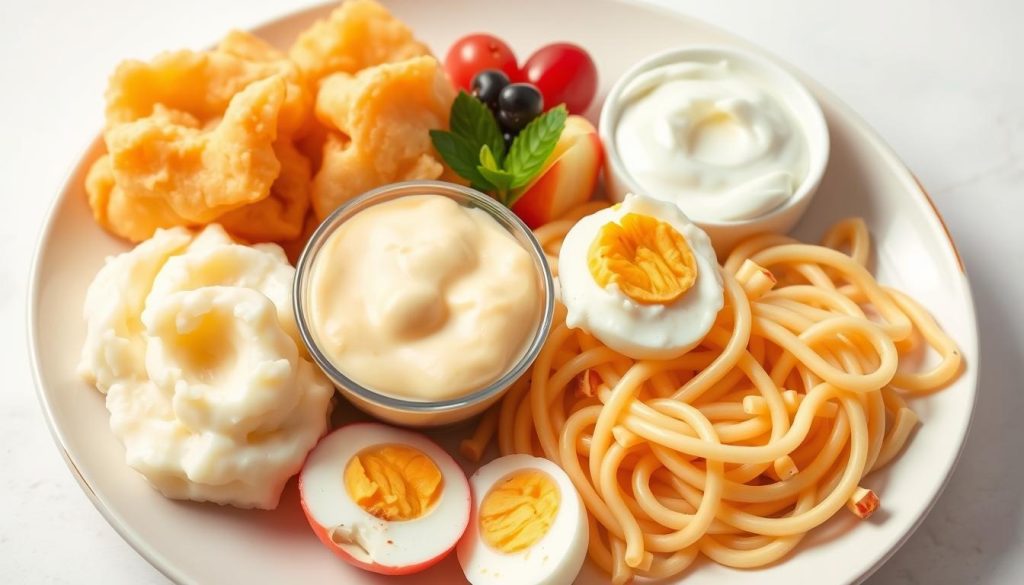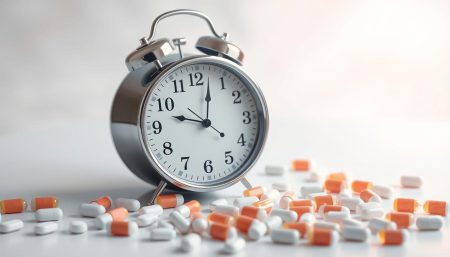Recovering from oral surgery can be tough, and eating is one of the biggest challenges. A soft food diet is key for patients with post-surgery needs. It helps with healing and keeps you comfortable while you recover.
Good nutrition is essential for healing after dental work. Finding foods that are gentle on sensitive areas and won’t mess with the surgery site is hard. The right soft foods give you the nutrients you need without causing pain or discomfort.
Knowing which soft foods to eat after oral surgery can greatly improve your recovery. There are many options, like smoothies and pureed veggies, that meet your nutritional needs without harming your mouth. This guide will help you find the best soft foods for a smooth recovery.
Understanding Dietary Restrictions After Oral Surgery
Oral surgery recovery needs careful attention to diet. The right foods help you heal, but some can slow you down. Let’s look at why changing your diet is key after oral surgery and how it affects your recovery.
Why Diet Modifications Are Necessary
After oral surgery, your mouth must heal. Eating soft, easy foods is important for jaw surgery recovery. These foods avoid irritating the surgery site and lower the chance of problems. Hard, crunchy, or spicy foods can slow healing and cause pain.
Duration of Dietary Restrictions
The time you need to stick to soft foods varies with the surgery. Usually, it’s 1-2 weeks. Your surgeon will give you specific advice based on your surgery and how you’re doing.
| Surgery Type | Soft Food Duration | Full Recovery Diet |
|---|---|---|
| Wisdom Teeth Removal | 7-10 days | 2-3 weeks |
| Dental Implants | 10-14 days | 6-8 weeks |
| Jaw Surgery | 4-6 weeks | 3-4 months |
Impact on Healing Process
Eating the right foods after oral surgery helps you heal faster and feel less pain. Soft, nutrient-rich foods give you the vitamins and minerals you need without hurting the surgery area. This gentle eating helps reduce swelling, stops infection, and helps tissues repair.

It’s important to follow your diet plan for a smooth recovery. Talk to your oral surgeon for advice on the best foods for your healing journey.
Essential Guidelines for Post-Surgery Nutrition
After oral surgery, eating right is key to healing. You need to plan your meals carefully. Here are some tips for good nutrition after surgery:

Eat plenty of protein to help your body fix itself and fight off infections. Choose soft foods like Greek yogurt, cottage cheese, or cooked eggs. If you can’t eat animal products, try silken tofu or pureed beans.
Also, eat foods full of vitamins and minerals. Make smoothies or purées from fruits and veggies. They help your body heal. Good choices include berries, spinach, and sweet potatoes.
- Stay hydrated with water, herbal teas, and clear broths
- Choose iron-rich foods to prevent anemia and support recovery
- Include calcium-rich options for bone health and strength
Don’t eat foods that are too hot or cold. Stick to lukewarm or cool foods to avoid discomfort. Avoid hard or crunchy foods that could hurt your mouth.
“Proper nutrition after oral surgery can significantly impact your recovery time and overall healing process.”
Eat small meals often to keep your energy up. If you’re having trouble getting enough nutrients, talk to your dentist or a dietitian. They can give you advice on what to eat after surgery.
Recommended Soft Foods After Oral Surgery
Choosing the right foods after oral surgery is key for a smooth recovery. Soft foods ease discomfort and provide essential nutrients. Here are some easy-to-chew meal ideas for your healing journey.
Temperature-Appropriate Foods
Lukewarm or cool foods are best during recovery. They soothe the surgical site and prevent irritation. Try room temperature soups, chilled smoothies, or slightly warm mashed potatoes. Avoid foods that are too hot or cold.
Texture Considerations
Smooth, pureed, or easily mashed foods are great after surgery. These textures minimize chewing and protect the healing area. Here are some options:
- Creamy yogurt
- Silky puddings
- Soft-cooked oatmeal
- Mashed avocado
- Pureed vegetables

Portion Size Guidelines
While nutrition is key, watch your portion sizes. Smaller, more frequent meals are easier on your healing jaw. Aim for 5-6 small meals a day instead of three big ones. This keeps your energy up without overexerting yourself.
| Meal Type | Recommended Portion Size | Example |
|---|---|---|
| Breakfast | 1/2 cup | Smooth oatmeal |
| Snack | 1/4 cup | Greek yogurt |
| Lunch | 3/4 cup | Pureed soup |
| Snack | 1/2 cup | Mashed banana |
| Dinner | 3/4 cup | Soft-cooked pasta |
Remember, these meal ideas are temporary. As you heal, you’ll gradually return to your normal diet. Always follow your dentist’s advice for the best recovery.
Nutritious Smoothie and Shake Options
After oral surgery, it’s important to eat liquids. Smoothies and shakes are great because they’re full of nutrients and easy to drink. They help you feel full and aid in healing.

When making smoothies, choose ingredients high in protein, vitamins, and minerals. Use Greek yogurt, silken tofu, or protein powder for protein. Add bananas, berries, or mangoes for sweetness and vitamins.
Leafy greens like spinach or kale are also good. They’re packed with nutrients but don’t change the taste much.
Here are some tips for a liquid diet:
- Blend ingredients well for a smooth texture
- Use ingredients at room temperature or slightly cool to avoid discomfort
- Add healthy fats like avocado or nut butter for feeling full
- Include ingredients like turmeric or ginger for their anti-inflammatory properties
Try these nutrient-rich smoothie options during your recovery:
| Smoothie Name | Key Ingredients | Main Benefits |
|---|---|---|
| Green Goddess | Spinach, banana, almond milk, Greek yogurt | High in protein, vitamins A and C |
| Berry Blast | Mixed berries, oat milk, silken tofu, chia seeds | Rich in antioxidants and omega-3s |
| Tropical Sunrise | Mango, pineapple, coconut water, vanilla protein powder | Hydrating with added protein boost |
| Chocolate Avocado | Avocado, cocoa powder, banana, almond milk | Heart-healthy fats and mood-boosting compounds |
Try different smoothies to find your favorites. Drink slowly and avoid straws to protect your mouth while enjoying these healthy drinks.
High-Protein Soft Food Choices
After oral surgery, it’s key to meet your nutritional needs for recovery. High-protein soft foods are important for healing and repairing tissues. Here are some tasty, easy-to-eat options that are full of protein.

Dairy-Based Options
Greek yogurt, cottage cheese, and soft cheeses are great choices. They’re gentle on your mouth and full of nutrients. Try mixing them with pureed fruits for extra flavor and vitamins.
Plant-Based Alternatives
For a plant-based diet, try silken tofu, mashed beans, or hummus. They’re high in protein and easy to eat. Blend them into smoothies or soups for a nutritious meal.
Protein Supplement Recommendations
Protein powders can help when eating whole foods is hard. Pick a smooth, unflavored one to mix into your favorite soft foods. Always talk to your doctor before adding supplements to your diet after surgery.
| Food Type | Protein Content (per 100g) | Texture |
|---|---|---|
| Greek Yogurt | 9g | Creamy |
| Silken Tofu | 8g | Smooth |
| Cottage Cheese | 11g | Soft |
Start adding these high-protein soft foods slowly as you get better. Always listen to your surgeon about what you should eat after surgery.
Pureed Vegetables and Fruits Guide
Adding pureed veggies and fruits to your diet after surgery can help you heal faster. They are also packed with nutrients. These meals are great for those who are recovering from oral surgery.
To make these purees, first cook the veggies until they’re soft. Then blend them with some broth or water for a smooth texture. You can puree fruits raw or cooked, depending on their texture.
Nutrient-Rich Puree Options
Here are some purees that are full of nutrients:
- Carrot and ginger puree: Rich in vitamin A and anti-inflammatory properties
- Spinach and pear puree: Packed with iron and vitamin C
- Sweet potato and apple puree: High in fiber and antioxidants
- Beet and berry puree: Loaded with antioxidants and vitamins
Feel free to mix and match these purees for different flavors. You can add them to soups, use them as dips, or enjoy them on their own.
| Puree | Key Nutrients | Flavor Profile |
|---|---|---|
| Carrot and Ginger | Vitamin A, Beta-carotene | Sweet and spicy |
| Spinach and Pear | Iron, Vitamin C | Mild and slightly sweet |
| Sweet Potato and Apple | Fiber, Vitamins A and C | Sweet and comforting |
| Beet and Berry | Antioxidants, Folate | Earthy and tart |
Strain your purees if they’re not smooth enough. These meals will help you stay nourished while you recover.
Safe Breakfast Options During Recovery
Starting your day with a nourishing meal is key for healing after oral surgery. Breakfast is important for your daily nutrition. It’s vital to choose soft foods that are gentle on your mouth. Let’s look at some easy-to-chew meal ideas that will keep you satisfied and support your recovery.
Hot Cereal Suggestions
Hot cereals are great soft foods after oral surgery. Oatmeal, cream of wheat, and rice porridge are nutritious. Cook them with milk for extra protein and calcium.
To add flavor and nutrition, try mixing in mashed banana, applesauce, or pureed berries.
Yogurt-Based Meals
Yogurt is a versatile base for easy-to-chew meals. Choose Greek yogurt for extra protein. Add honey for sweetness or mix in pureed fruits for variety.
Smooth cottage cheese is another dairy option that’s gentle on healing gums.
Egg Preparations
Eggs are protein-rich and can be prepared in various soft textures. Scrambled eggs, soft-boiled eggs, or egg custard are all suitable choices. For added nutrients, incorporate finely chopped spinach or smooth avocado into your scrambled eggs.
- Oatmeal with mashed banana
- Greek yogurt with honey
- Scrambled eggs with avocado
- Soft-boiled eggs
- Cream of wheat with pureed berries
Remember to eat slowly and take small bites. These breakfast options provide essential nutrients while being gentle on your healing mouth. They are ideal soft foods after oral surgery.
Lunch and Dinner Meal Planning
Planning meals after oral surgery can be tough. But, with a little creativity, you can make tasty, healthy meals. Here are some great lunch and dinner ideas that are soft and easy to eat.
For lunch, try creamy potato soup with roasted garlic. It’s comforting and full of flavor. Another good choice is smooth butternut squash puree with Greek yogurt on top for extra protein.
Dinner can also be delicious with soft foods. Think about tender pulled chicken with mashed avocado. Or, enjoy creamy risotto with grated Parmesan and pureed veggies.
To keep things exciting, change up your meals each week. Here’s a simple meal plan:
| Day | Lunch | Dinner |
|---|---|---|
| Monday | Tomato bisque | Mashed sweet potato with ricotta |
| Tuesday | Soft-boiled eggs with hummus | Pureed lentil curry |
| Wednesday | Smoothie bowl with banana and peanut butter | Salmon mousse with cauliflower puree |
| Thursday | Creamy spinach soup | Soft polenta with mushroom ragu |
| Friday | Cottage cheese with mashed berries | Shepherd’s pie (mashed potato top only) |
Make meals ahead of time and keep them fresh. This way, you’ll always have something tasty and easy to eat when you’re hungry during your recovery.
Foods to Avoid During Recovery
Choosing the right foods after oral surgery is key for healing. Some foods can slow down recovery and cause pain. It’s as important to know what to avoid as it is to know what to eat.
Common Problematic Foods
Avoid these foods to protect your surgical site:
- Crunchy foods like chips, popcorn, and nuts
- Chewy items such as tough meats and sticky candies
- Acidic foods like citrus fruits and tomatoes
- Spicy dishes that may irritate the mouth
- Hot beverages that can dissolve blood clots
When to Reintroduce Regular Foods
Gradually going back to your normal diet is important. Here’s how:
- Start with liquids and progress to soft foods
- Introduce semi-soft foods after 1-2 weeks
- Try solid foods around 4-6 weeks post-surgery
- Always consult your surgeon before making dietary changes
Remember, everyone heals at their own pace. Listen to your body and follow your doctor’s advice for the best recovery foods and nutrition plan.
Hydration Guidelines and Beverage Options
Staying hydrated is key after oral surgery. Drinking enough water helps your body heal and eases pain. Try to drink 8-10 glasses of water a day. This keeps your body hydrated and removes toxins.
Water is the top choice for staying hydrated. But, you can also try other drinks to meet your needs. Herbal teas like chamomile or peppermint can calm your mouth and offer comfort. Stay away from hot drinks as they might irritate the surgery site. Opt for drinks at room temperature or slightly cool.
Drinks rich in nutrients can help with your recovery. Here are some good options:
- Protein shakes
- Meal replacement smoothies
- Vegetable juices
- Coconut water
These drinks give you important vitamins and minerals for healing. When drinking, use a straw to avoid touching the surgery area. Avoid carbonated drinks, alcohol, and very hot or cold drinks during your recovery.
| Beverage Type | Benefits | Precautions |
|---|---|---|
| Water | Hydration, toxin removal | Drink at room temperature |
| Herbal tea | Soothing, anti-inflammatory | Allow to cool before drinking |
| Protein shakes | Nutrient-rich, filling | Avoid chunks, use smooth textures |
| Vegetable juices | Vitamin and mineral boost | Strain to remove pulp |
Meal Preparation Tips and Techniques
After oral surgery, meal prep needs some tweaks. The right tools and methods help make tasty, healing purees and soft foods. Here are some tips to ease your recovery.
Kitchen Tools Needed
Having the right tools makes soft food prep easier. Here are some must-haves:
- Blender or food processor for smooth purees
- Immersion blender for quick soups and sauces
- Potato masher for chunky textures
- Fine-mesh strainer to remove seeds or pulp
- Slow cooker for tender meats and vegetables
Food Storage Methods
Proper storage keeps your meals fresh and safe. Try these methods:
| Method | Best For | Storage Time |
|---|---|---|
| Refrigeration | Soups, smoothies, yogurt dishes | 3-4 days |
| Freezing | Pureed vegetables, fruit sauces | 2-3 months |
| Vacuum sealing | Cooked meats, fish | 1-2 weeks (refrigerated) |
Batch cooking soft foods saves time during recovery. Portion meals into single servings for easy reheating. Label containers with contents and dates to track freshness. With these tips, you’ll have a variety of nutritious, easy-to-eat options throughout your healing process.
Managing Pain and Discomfort While Eating
Eating after oral surgery can be tough. Pain and discomfort might make you not want to eat. But, with the right foods, you can manage pain and keep up with your nutrition.
Take small bites and chew slowly. This helps avoid putting too much pressure on your surgery site. Use a small spoon or fork to control how much you eat. If you can, eat with the side of your mouth that’s not sore.
Cold therapy can help a lot. Apply an ice pack to your cheek for 15 minutes before you eat. This numbs the area, making it easier to eat. For warm foods, let them cool down to room temperature to avoid irritation.
Rinse your mouth gently with salt water after eating. This keeps the area clean and helps it heal. But, avoid swishing too hard, as it could dislodge blood clots.
If you’re taking pain medication, take it about 30 minutes before you eat. This way, the medicine works when you need it most. Always follow your doctor’s advice on how to use the medication.
- Eat slowly and carefully
- Use cold therapy before meals
- Rinse gently after eating
- Time pain medication with meals
Remember, healing takes time. Be patient with yourself as you learn to eat during recovery. If the pain gets worse or doesn’t go away, call your oral surgeon for help.
Nutrient-Rich Soup and Broth Recipes
Soups and broths are great for after oral surgery. They’re comforting, hydrating, and packed with nutrients. Here are some nourishing options that fit liquid diet recommendations and puree recipes for healing.
Bone broth is a healing superstar. It’s full of collagen and minerals, helping repair tissues. Here’s a simple recipe:
- Simmer beef or chicken bones for 12-24 hours
- Add vegetables like carrots and celery
- Season with salt and herbs to taste
- Strain and enjoy warm
For a vegetarian choice, try this creamy carrot soup:
- Sauté onions and garlic in olive oil
- Add chopped carrots and vegetable broth
- Simmer until carrots are soft
- Blend until smooth
- Stir in coconut milk for creaminess
Let soups cool a bit before eating. You can add more liquid if they’re too thick. These recipes are full of nutrients and easy on your healing mouth.
| Soup Type | Key Nutrients | Benefits |
|---|---|---|
| Bone Broth | Collagen, Minerals | Supports tissue repair |
| Carrot Soup | Vitamin A, Fiber | Boosts immune function |
| Lentil Soup | Protein, Iron | Promotes healing |
Try different puree recipes for healing. Blend cooked veggies with broth for a tasty, easy meal. These liquid diet suggestions help you get the nutrients you need while your mouth heals.
Special Dietary Considerations
After oral surgery, it can be hard to get the right nutrition, even more so for those with special diets. This part looks at soft foods after surgery that fit different dietary needs.
Diabetic-Friendly Options
Diabetics must watch their carb intake. Good choices include sugar-free yogurt, pureed veggies, and protein smoothies with unsweetened almond milk. These foods help keep blood sugar stable and provide important nutrients.
Gluten-Free Choices
Those with celiac or gluten sensitivity can find many soft foods that are naturally gluten-free. Options include mashed potatoes, rice pudding, and gluten-free oatmeal. Always check labels to make sure they are gluten-free.
Vegetarian and Vegan Alternatives
Plant-based diets can also meet post-surgery nutritional needs. Soft tofu, pureed legumes, and smoothies with plant-based protein powders are great. They offer essential proteins and nutrients without giving up on dietary preferences.
| Dietary Need | Soft Food Options | Key Nutrients |
|---|---|---|
| Diabetic-Friendly | Sugar-free yogurt, pureed vegetables | Protein, fiber, vitamins |
| Gluten-Free | Mashed potatoes, rice pudding | Carbohydrates, energy |
| Vegetarian/Vegan | Soft tofu, pureed legumes | Plant-based protein, iron |
It’s key to talk to a healthcare provider or dietitian for advice on soft foods after surgery. They can tailor a meal plan that fits your post-surgery needs and dietary preferences or restrictions.
Recovery Timeline and Diet Progression
After oral surgery, many patients wonder when they can eat normally again. The time it takes to move from liquid diets to solid meals varies. Most start with clear liquids, then full liquids within a few days.
During this time, smooth soups, yogurt, and protein shakes are common. These foods are easy to swallow and help with healing.
As healing advances, soft foods become the next step. This usually happens 3 to 7 days after surgery. Foods like mashed potatoes, scrambled eggs, and soft pasta are recommended. It’s important to avoid hard or crunchy foods that could irritate the surgical area.
The final stage is introducing regular foods. This can take 2 to 4 weeks, depending on how well you heal. Look for signs like less swelling and pain to know you’re on the right track.
Always follow your surgeon’s advice on when to start eating solid foods again. Keeping your mouth clean is also key to healing and avoiding problems.
FAQ
Q: How long should I follow a soft food diet after oral surgery?
A: The time you need to eat soft foods after oral surgery depends on the procedure and how fast you heal. For minor surgeries, it’s usually 1-2 weeks. For more complex ones, it might be 4-6 weeks. Always listen to what your oral surgeon tells you.
Q: What are some high-protein soft foods I can eat after oral surgery?
A: Good high-protein soft foods include Greek yogurt, cottage cheese, and scrambled eggs. You can also try mashed tofu, pureed lean meats, and protein-rich smoothies. These foods are easy to eat and help with healing.
Q: Can I drink through a straw after oral surgery?
A: It’s best to avoid straws for at least a week after surgery. Drinking through a straw can dislodge blood clots and cause dry socket. Always check with your oral surgeon for the best advice for your situation.
Q: What temperature should my food and drinks be after oral surgery?
A: Eat and drink foods that are lukewarm or cool after surgery. Avoid very hot or cold foods as they can be uncomfortable and slow healing. Room temperature or slightly cooled items are usually the most comfortable.
Q: Are there any fruits and vegetables I can eat after oral surgery?
A: Yes, you can eat many fruits and vegetables after surgery if they’re prepared right. Try mashed bananas, applesauce, and smoothies with soft fruits. Make sure all vegetables are cooked until very soft and pureed if needed.
Q: How can I ensure I’m getting enough nutrients on a soft food diet?
A: To get enough nutrients, eat foods that are rich in nutrients and include different food groups. Add protein like yogurt or pureed meats, fruits and veggies in smoothies, and fortified cereals or supplements if needed. Talking to a dietitian can also help.
Q: What are some easy-to-prepare meal ideas for recovering from oral surgery?
A: Good meal ideas include oatmeal with mashed banana, blended soups, and smoothie bowls. You can also try mashed potatoes with pureed meat and gravy, and soft scrambled eggs. These meals are easy to make and gentle on your healing mouth.
Q: How can I manage pain while eating after oral surgery?
A: To manage pain, take pain medication 30 minutes before eating, eat slowly, and avoid hot or cold foods. Using a small spoon and taking small bites can also help. If the pain gets worse, contact your oral surgeon.
Q: When can I start reintroducing regular foods after oral surgery?
A: When you can start eating regular foods again depends on your surgery and healing. For minor procedures, it’s usually 1-2 weeks. For more complex ones, it might be 4-6 weeks. Always follow your oral surgeon’s advice and go slow to avoid discomfort.
Q: Are there any special considerations for diabetic patients on a soft food diet after oral surgery?
A: Diabetic patients should eat balanced soft meals that include protein, complex carbs, and non-starchy veggies. Good options are sugar-free yogurt, pureed chicken with mashed cauliflower, and veggie smoothies with protein. It’s important to watch your blood sugar closely and get advice from your oral surgeon and endocrinologist.


















